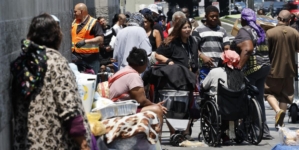-
Amid ICE raids, MLBPA advises players to keep legal documents with them - 22 mins ago
-
Harry Potter HBO TV Series Reboot: See Full Cast As Filming Begins - 24 mins ago
-
Federal judge reverses a CFPB rule to strip medical debt from credit reports. Here’s what it means. - 26 mins ago
-
Pro Bowl G Trey Smith, Chiefs Reportedly Agree to Mammoth Extension - 41 mins ago
-
In their own words: Unhoused people on Skid Row talk about current conditions - about 1 hour ago
-
Wildfires Updates: Oregon, Colorado Blazes Spark Evacuations, Destroy More Than 40,000 Acres - about 1 hour ago
-
Lowering your electric bill could be floating in the ocean - about 1 hour ago
-
Woman fatally poisons estranged in-laws with mushroom-laced beef Wellington - about 1 hour ago
-
2025 MLB All-Star Game: Most Memorable All-Star Moments Throughout History - about 1 hour ago
-
Erotic ancient Roman mosaic looted by Nazi officer returned to Pompeii - 2 hours ago
USC signals layoffs as deficit surpasses $200 million amid ‘volatile external environment’
Citing a budget deficit in excess of $200 million, the University of Southern California’s interim president said Monday that an undisclosed number of layoffs and other belt-tightening measures would be implemented to “deal decisively with our financial challenges.”
Beong-Soo Kim wrote in a letter addressed to faculty and staff that USC is “experiencing significant shifts in federal support” for its research and other programs — a product of the Trump administration’s sweeping effort to cut billions of dollars in grants — and also faces “potential decreases in international student enrollment.”
At the same time, Kim said, USC’s expenses have “significantly outpaced” its revenue for several years.
Recent cost-cutting — including a hiring freeze announced in March — hasn’t been enough. Kim said that by the end of the fiscal year that concluded in June, the university’s deficit had mushroomed to more than $200 million, a notable increase from $158 million a year earlier.
In addition to layoffs, Kim said, USC will also sell unused properties and adjust compensation for its highest earners, among other moves. He added: “By taking these tough actions now, I am absolutely confident that USC can and will emerge stronger, ready to continue transforming lives and benefiting our society for generations to come.”
Universities across the country have reeled in recent months as President Trump has upended decades of norms in higher education, with tens of billions of dollars of federal funds threatened or withheld.
In March, the University of California announced a systemwide hiring freeze and cuts in several areas amid Trump’s threats to slash its research funding. In late June, Stanford disclosed $140 million in general operating fund cuts and related layoffs for the upcoming 2025-26 academic year, citing “significant uncertainty about how federal support for universities will evolve.”
And last week, Boston University announced it would give pink slips to about 120 staff members in an attempt to reduce its budget by 5%.
Kim said it’s possible that a university with the scale of USC could lose federally sponsored research funding worth more than $300 million annually.
Referencing today’s “volatile external environment,” Kim said that the university would “continue to advocate for the vital importance of research and our academic mission,” but added, “we cannot rely on the hope that federal support will revert to historical levels.”
Some at USC see things differently from the interim president.
In interviews, two university employees acknowledged how grave the federal funding losses could be — but they also cited several pricey projects that they believe have hurt USC’s finances. Those endeavors include the construction of the Bloom Football Performance Center, which broke ground in November; the installation of enhanced security measures in the aftermath of spring 2024 protests over Israel’s war in Gaza; and the opening of the university’s Capital Campus in Washington, D.C., in 2023.
Sanjay Madhav, an associate professor of practice at the USC Viterbi engineering school, said that these and other costly ventures were part of a “series of poor decisions” made by university leadership in recent years.
“The administration has made a lot of irresponsible financial decisions,” said Madhav, who is involved in a union organizing effort for non-tenure track professors. “The regular employees, they ultimately pay the price for the poor decisions.”
USC’s Capital Campus in Washington, D.C.
(New Media Systems Inc.)
In an email, The Times described some of the criticism and asked the university for comment. In response, a spokeswoman for USC said that the “information that is available” was in Kim’s letter.
The interim president did not indicate how many people would lose their jobs or provide other details about the cuts. “That USC is not alone in having to take these difficult actions does not make this news any less disappointing or painful to hear,” he said.
Kim’s letter comes just days after The Times reported on a trim within USC’s athletics department, including the laying off of six people and elimination of another six positions. Among the departures was Paul Perrier, an executive senior associate athletic director.
It’s not clear if the cuts at the athletics department are part of the layoffs described by Kim; asked about those reductions, the university spokeswoman again referred The Times to the interim president’s letter.
Uncertainty over the size and scale of the looming job cuts has left workers demoralized, said Phil Turner, who has worked at the university since 2009 and is associate director of USC Housing. He also serves as president of the USC Staff Assembly, which advocates for employees.
“Staff morale is in tatters — I think it is the worst it has ever been in the 16 years I’ve been here,” said Turner, who was speaking as an employee and not in an official capacity. “I think everybody is just aching for some sort of win or positive momentum, but it is not there. Obviously, we need to course correct as a university.”
Kim’s letter said that he welcomed feedback and directed readers to a web page where they could offer suggestions about the university’s “financial resilience efforts.”
But Madhav said that it would be hard to weigh in with so few details known about the university’s plan. Instead, what he’s hoping for is concrete information about the impending job reductions.
“If anyone is going to be laid off, they’d like to know with as much notice as possible,” he said. “Especially given how difficult the job market is now.”
Times staff writer Jaweed Kaleem contributed to this report.
Source link






























